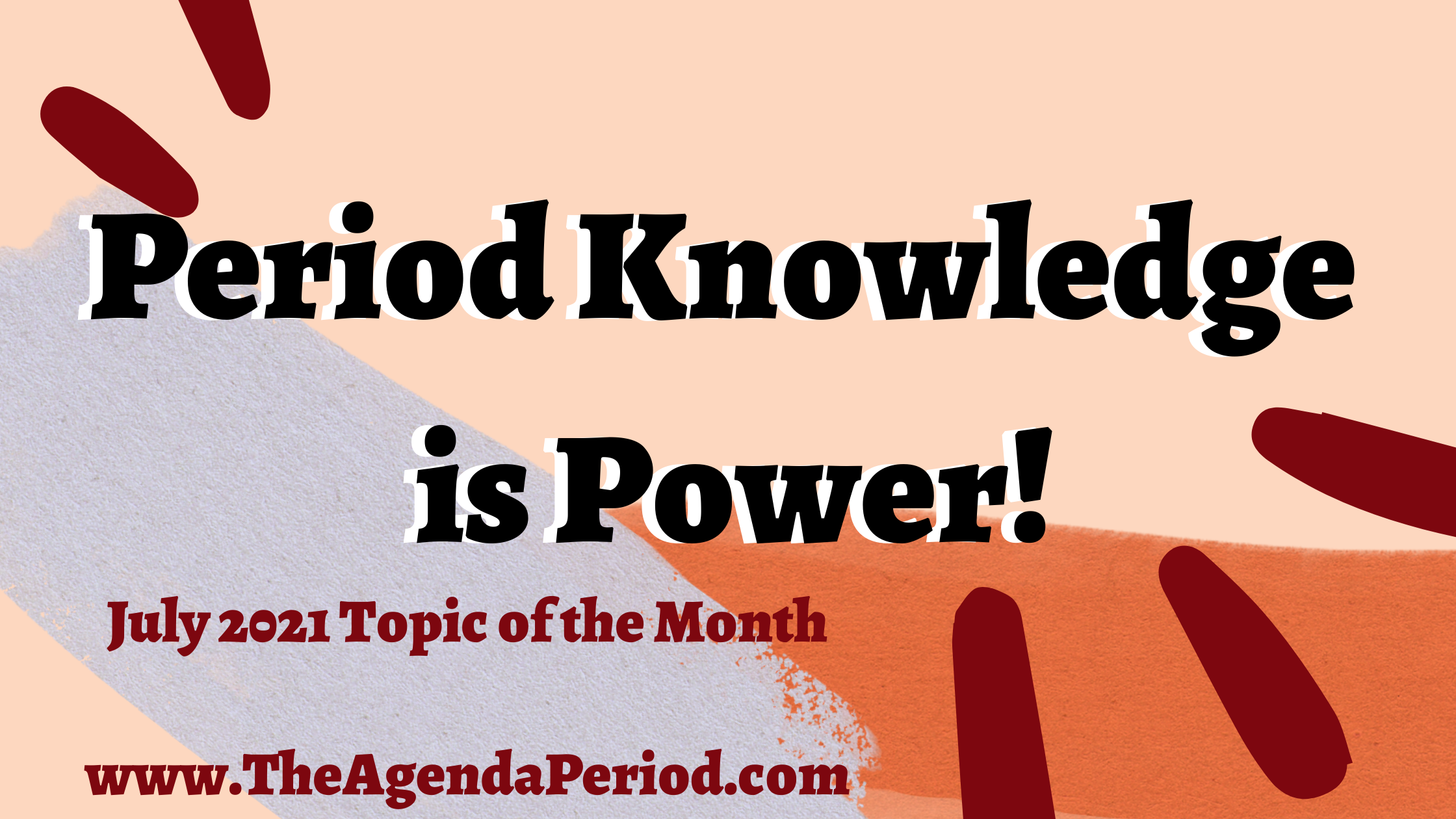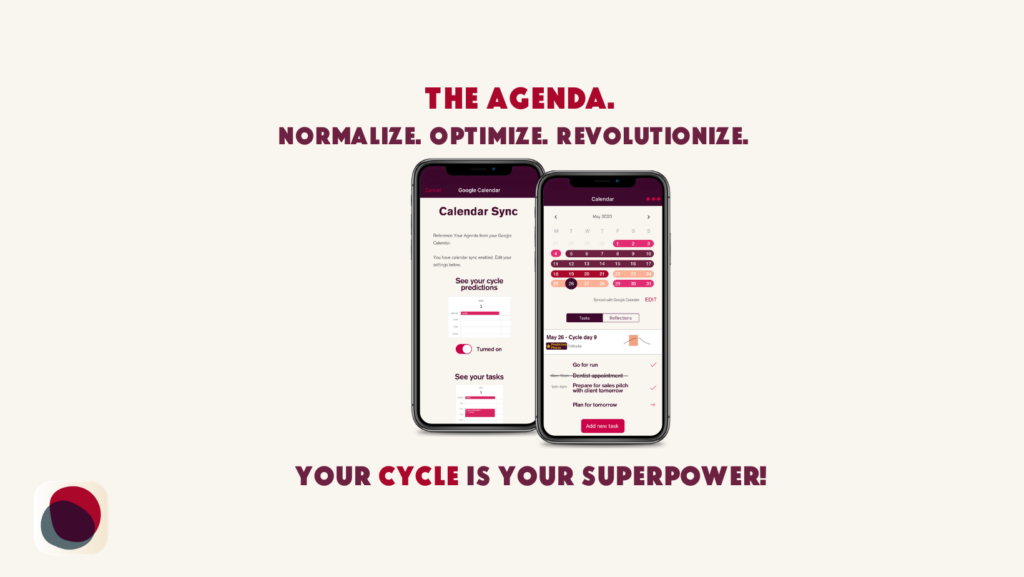
Period Knowledge is Power
Period knowledge is power, but if we do nothing with the knowledge, there is no power…
According to The Agenda.Period estrogen drops quickly after ovulation and we may feel sluggish, irritable, more sensitive and doubting. Mood swings and/or pain as we near the next phase, which is our menstrual phase. This is FANTASTIC information to have if we do something with it and it grows our period knowledge!
We’ve all been in a mood when we want to avoid people or seriously consider killing our significant other.
Those quirks we found so cute in our kids last week, suddenly make us want to tear their heads off.
We’re less likely to tolerate snarky behavior from co-workers and the micro-managing boss seems extra… punchable.
Don’t worry Dollface, This is the luteal phase of your period and it’s normal.
You may be wondering, why does this matter and why is a Mental Fitness and Resilience Expert talking about your menstrual cycle?
Well, it’s quite simple, if we understand our bodies and know what phase we are in, we will understand the impact each phase will have on our thoughts, feelings and behaviors. The only three things we can ever control….
We are all experts in the shitty part of the stories we tell. Our inner critic is in heaven and loudly telling us all the things we’ve done wrong and how we’re going to continue to fuck up our lives and the lives of those we love…. This is amplified during our luteal phase.
I want to repeat that for those in the back.
Every day our inner critics tell us the stories of certain death and destruction that our lives will experience and then in the luteal phase, they get louder and more explosive.
As a Mental Fitness Trainer it is literally my job to help you prepare for all the stress you are about to experience — perceived as it usually is — and how better to be prepared than to FULLY UNDERSTAND YOUR BODY?!
And yet, when you have ALL the information you will need to understand your body and your emotions, you do nothing with it!? Why is your response to your luteal phase “Yep” and then continue to act as if you don’t know what’s happening?
KNOCK IT TF OFF!
If this doesn’t apply to you, if you use this knowledge to your advantage and soften the blow, stop reading and just skip straight to the share button.
For the rest of you, especially those who are aware and still do nothing with the information, continue to read, but maybe make sure you’re in the ovulation phase…. What I’m about to provide you is a dose of Radical Responsibility and you may not like it during a time when you’re more…. Hmmm… let’s say reactive. 😉
Why period knowledge changes everything:
For centuries we have been taught little to nothing about our bodies except that we bleed and how to use our cycle to understand when we’re most fertile, because bearing children has been our ‘purpose’ for so long. (insert snarky sarcasm here)
We’ve been shamed, humiliated and we all have stories of that horrifically embarrassing moment in school when we needed to cover ourselves and run to the bathroom. If we find ourselves now, as adult women, unprepared for our monthly visitor, we secretly and shamefully whisper to another woman asking if she has a tampon. As if she has never needed one and we’re deserving of this embarrassment….
Let me be clear, I am fully supportive of those who want to understand their cycle for the sole purpose of having children, I am also a massive advocate for those who want to embrace this knowledge to up their Goddess game.
I’m also really over the bullshit of said shame and the use of our cycle as an excuse.

How to use your period knowledge in your life.
Once I realized that our cycles were normal and knew how to harness the period knowledge power it provides in my business, it was so much easier for me to prepare myself for the shorter fuse I would inevitably have during my luteal phase.
I also recognized the boldness, confidence and sheer audacity I had to reach out to people I would otherwise not. People I thought were ‘out of my league’ or on my chicken list.
Yes! I had fewer fucks to give about what people thought of me and I simply asked the questions!
So yeah, I knew I would be a little more irritable, but I also knew it was the perfect time to act on the wants that I had convinced myself I didn’t deserve any other time. That’s some kind of powerful we all can tap in to!
So, knowledge is power, right? Then act on it!
Here are some tips for you to prepare for your shortened fuse and bolder attitude so you can ultimately be significantly more prepared for this part of your cycle.

Track your cycle
If you aren’t already tracking your cycle, jump over to The Agenda.Period and download the app. It’s available on both Android and iOS. If you are a paper person, buy the Agenda Journal to track on hardcopy!
Make your lists
Who is on your chicken list? Not sure what this is? It’s the people you want to ask some kind of question to, but have convinced yourself they aren’t interested in talking with you…. (Hello inner critic!)
Figure out what you want to ask them and keep that list handy. When you feel that burst of confidence, Girl ACT!
Ask yourself honest questions:
Am I annoyed with ____ because this is consistent behavior?
What proof do I have of these ‘truths?’
How would I handle this any other time?
Pause
When we’re annoyed, angry, or otherwise just do not have the capacity for grace, we need to give ourselves the space to pause before we react. At the very least, take a couple of deep breaths. You’ll thank yourself later.
Love yourself
Self-care is important no matter what phase you are in, and it is extra important during the luteal phase.
Go for a walk.
Get a massage.
Don’t schedule important meetings
No matter what phase you are in, period knowledge of your body is the ultimate power.
Understanding what you’re feeling, why you’re feeling it and how to use it to your advantage is a gift. It’s time to stop shaming, punishing and blaming ourselves and start looking in the mirror and recognizing the magic you hold!
Use what we have been given to plan ahead: increase sales, build relationships, and pause when it’s in our best interest.
Only you decide how to harness your cycle and how to use the knowledge.
You are force. A fucking Goddess! You, my dear, are a menstruator and there is zero shame in that!

“Until we make the unconscious conscious, it will rule our lives and we will call it fate.” Carl Jung
As a Mental Fitness and Resilience Coach, my goal is to help women business owners acknowledge and adjust their thoughts, behaviors and actions to flow through life’s setbacks with less stress, more productivity and focused determination.
Resilience = The sustained ability to navigate the unknown with focused determination and a positive outlook
Connect with Rina Jensen
Website: https://www.rinajensen.com
Facebook: https://www.facebook.com/RinaLJensen
LinkedIn: https://www.linkedin.com/in/rinajensen/





